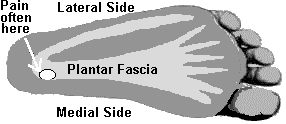Sport Rehabilitation and Physiotherapy for Plantar Fasciitis
What is Plantar Fascia?
The Plantar Fascia is a band of very thick fibrous tissue that runs from under the heel to the front of the foot. The fascia becomes weak and irritated at the attachment to the heel.
What causes Plantar Fasciitis?
It is more common in people who pronate (foot rolling inward) and more so if overweight as this puts excessive strain on the fascia. It can also be due to; – having high arches or flat feet, prolonged walking, standing or running and wearing ill-fitting shoes.
What are the symptoms of Plantar Fasciitis?
Heel pain when weight is put on the foot, in more severe cases there may be tenderness and swelling under the heel and numbness along the outside of the sole of the foot. Pain is usually worse when first standing in the morning and usually eases quickly but can increase during the day if doing increased weight bearing.
What will treatment consist of for Plantar Fasciitis?
Massage – Encompassing a variety of techniques with sufficient pressure through the superficial tissue to reach the deep lying structures. It is used to increase blood flow, decrease swelling, reduce muscle spasm and promote normal tissue repair.
Deep friction – An aggressive massage technique applied across the tissue as deeply as possible to break down scar tissue, restore normal movement and prepare the structure for mobilisation or manipulation. This technique is initially painful but then causes a numbing effect.
Mobilisation – A manual technique where the joint and soft tissues are gently moved by the therapist to restore normal range, lubricate tissues and relieve pain.
Ultrasonic Therapy – Transmits sound waves through the tissues stimulating the body’s chemical reactions and therefore healing process, just as shaking a test tube in the laboratory speeds up a chemical reaction. It reduces tissue spasm, accelerates healing and results in pain relief.
Interferential Therapy – Introduces a small electrical current into the tissues and can be used at varying frequencies for differing treatment effects. E.g. pain relief, muscle or nerve stimulation, promoting blood flow and reducing inflammation.
What other treatments could be used for Plantar Fasciitis?
Acupuncture – An oriental technique of introducing needles into the skin to increase or decrease energy flow to promote pain relief and healing.
Podiatry – An analysis of the foot mechanics and structure during walking or running and correction as appropriate.
Injection Therapy – A specialist procedure during which a non-harmful steroid and local anaesthetic are injected directly into the injured structure. It has a dramatic effect on removing inflammation and promoting healing. Your therapist might recommend an injection before “hands on” physiotherapy is commenced.
What can you do yourself to help Plantar Fasciitis?
Active Rest – Keep active but avoid increased weight bearing activities that may put excessive strain through the foot.
Cold treatment – Place a standard sized tin in the freezer and when taking out run under the cold tap first to prevent an ice burn. Then roll the tin under the arch of the foot using heavy pressure for a maximum of 20 minutes.
Exercise programme – This is the most important part of the rehabilitation. Your therapist will instruct you as to which exercises to begin with, when to add the others, as well as how to progress the exercises.
Medication – Ask your GP or Pharmacist for advice on the best medication for your condition.
What if physical therapy does not help or resolve Plantar Fasciitis?
It is rare that treatment does not resolve this condition. In these cases a cortisone injection may be appropriate and in very extreme cases surgery. These options can be discussed with your therapist if appropriate.
If you think you may have this condition we would love the opportunity to show you our expertise in the treatment and management of this condition so – Please click here for details of how to contact us to book an appointment
If you are unsure whether you have this condition or you would just like to speak to somebody then please get in touch here or call 0161 745 7551 or 0151 515 2323

